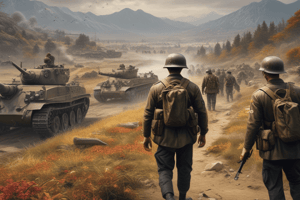Podcast
Questions and Answers
What did the Korean War demonstrate about the United States' foreign policy?
What did the Korean War demonstrate about the United States' foreign policy?
- A preference for unilateral action
- A commitment to containing communism and collective security (correct)
- A shift towards isolationism
- A focus on economic diplomacy
What triggered the United Nations' intervention in the Korean War?
What triggered the United Nations' intervention in the Korean War?
- The Inchon landing
- China's entry into the war
- The Battle of the Chosin Reservoir
- North Korea's invasion of South Korea (correct)
What was a significant consequence of the Korean War?
What was a significant consequence of the Korean War?
- The reunification of North and South Korea
- The end of the Cold War
- The establishment of a permanent peace treaty
- The reminder of the complexities of international relations (correct)
What was the outcome of the negotiations that began in July 1951?
What was the outcome of the negotiations that began in July 1951?
When did China enter the Korean War?
When did China enter the Korean War?
Study Notes
The Korean Conflict: An Overview
The Korean Conflict, commonly known as the Korean War, was a significant event in the history of the Korean Peninsula and the world. It was a three-year-long military engagement from June 25, 1950, to July 27, 1953, between North and South Korea, China, and the United Nations, primarily the United States. The war was fought to prevent North Korea, supported by the Soviet Union, from invading South Korea and to protect the sovereignty of the Republic of Korea (ROK).
Causes of the Korean Conflict
The Korean Conflict had its roots in the post-World War II era when Korea was divided into North and South along the 38th parallel. The United States and the Soviet Union agreed to this division as a temporary measure, but the Soviets established a dictatorship in North Korea, and the division became permanent. This led to the creation of the Korean People's Army (KPA) in North Korea, which was aided by the Soviet Union. In South Korea, the Republic of Korea Army (ROKA) was formed, and the two sides engaged in partisan warfare and small-scale border conflicts from 1948 to 1950.
Effects of the Korean Conflict
The Korean War had a profound impact on the Korean Peninsula and the world. It resulted in the deaths of an estimated 2.5 million people, including civilians and military personnel. The war also led to the division of Korea into two hostile states, North and South, and the creation of the heavily armed Demilitarized Zone (DMZ) between them. Additionally, the war demonstrated the United States' commitment to containing communism and its foreign policy based on collective security.
Key Events in the Korean Conflict
The Korean War was marked by several significant events. In June 1950, North Korea invaded South Korea, and the United Nations intervened to support the South. The war saw major battles such as the Inchon landing, the Battle of the Chosin Reservoir, and the Battle of Kapyong. In 1951, China entered the war, and intense fighting ensued. Negotiations for an armistice began in July 1951, but it took two more years to reach an agreement. On July 27, 1953, an armistice was signed, which established a de facto boundary between North and South Korea and brought the fighting to an end.
The Korean Conflict remains a significant part of world history, and its lessons continue to be studied and discussed. It serves as a reminder of the complexities of international relations and the consequences of military conflict.
Studying That Suits You
Use AI to generate personalized quizzes and flashcards to suit your learning preferences.
Description
Test your knowledge of the Korean Conflict, also known as the Korean War, with this quiz covering its causes, key events, and effects. Learn about the military engagement between North and South Korea, China, and the United Nations that shaped the Korean Peninsula and the world.




